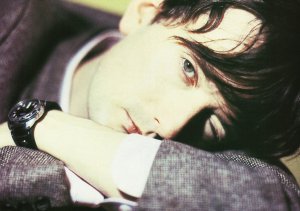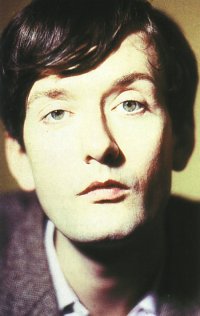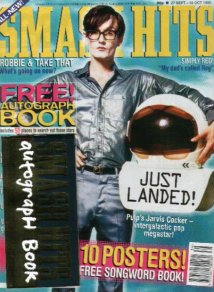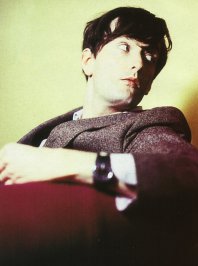 Duty to what?
Duty to what? Vox New Years Honours: Jarvis Cocker
Vox New Years Honours: Jarvis CockerFor Enduring Devotion To The Pop Cause... Jarvis Cocker
He is an inspiration to us all. For 16 years he's held his head up high in the face of adversity and kept his shirt collar wide open. Now, as Pulp cross the finishing line of an outstanding 12 months, he's sorted for fame, wealth, adulation and a barrel-load of Crimplene suits. So tell us, High Prince Of Pop, does it make you feel good?
"I could get me old man out, slap it down and have it blown up to A3 size," says Jarvis, volunteering his cock for photocopying. In the international department of his publicity management machine, Jarvis Branson Cocker, pop star, age 31, sits clamped into a corporately padded chair, preparing to square off with a camera one more time in a year of soul-stealingly endless photo sessions.
He has shaved in the company's toilets, the make-up girl has touched him up - complementing him on a complexion unravaged by the past month's touring - and now he sits waiting for photographer Cummins' film to arrive, surrounded by three emblems of the new Cocker reality (make-up, camera, tape recorder), discussing whether he should photocopy himself instead, bit by bit, enlarged cock first, just to make a change.
The notion that Jarvis should blow up his penis on the company's whirring Xerox is something of a symbolic gift. After a 16 year wait, 1995 has seen his persona and sexual allure explode in magnified fragments all over Britain. there have been the smash hits ('Common People', 'Mis-Shapes') and Smash Hits front covers, TOTP take-overs and Pop Quiz triumphs, Oasis-supporting super-gigs, and Stone Roses-replacing Glastonbury headlinings, Breakfast TV Jarvis days and Richard & Judy sessions, gay magazine interviews and tabloid drug farce run-ins, HMV megastore stormings (the wildest since Moz!), and celebrity soccer match encounters with streakers.
Oh, and in between, mostly in a brandy-fuelled few nights after the fame boost of 'Common People', Jarvis wrote two-thirds of the new Pulp album, 'Different Class', which one reviewer described as demonstrating "the kind of condescension-free empathy that only comes when you've lived and breathed the same (extra)ordinary life as your characters". Note the past tense there. "Lived." In the Island Records office, the phone goes. Jarvis picks it up, but he can't transfer the call. "I'm just a pleb who doesn't know about these things. I'm just a singer," he tells the voice on the other end, self-mockingly. But in truth, Jarvis is now neither just a pleb nor just a singer.
Onto the historical fact of his ordinary, suburban excluded, un-shagged, mis-shapen self has been grafted the boob-job of fame. All eyes now swivel when Jarvis enters the room, and for Cocker - whose sense of self (and songwriting) has been defined since pre-adolescence by exclusion - mass attention and acceptance is hardly likely to be unproblematic. This year Jarvis went to Iceland for his holidays, because it's the kind of place that "looks like man's never existed". Not hard to figure why. Cocker is no longer on the dole in Sheffield, working at the Special Needs Centre For The Under-Fives and living above the weird old silk factory with the freaks coming round. Nor is he the accidentally celibate St Martin's film student peeping at London life and plotting. Instead, he inhabits the bubble of his own success. Tours. Travel. Questions about 'Britpop'. Photo-sessions. Sure, here comes more mediated Jarvis, another feature, but now it's time for him to take stock. Has it gone too far? What's it all been for?
Today, at the end of a long Pulp tour, he's clearly tired and somewhat worried about not being able to lead a 'normal' life. Worried that he's turning into something he didn't intend. Vitally, for those who actually care about Pulp the band (not just the personality cult of the man himself), now that he's away from the net curtains, synthetic furniture, warm tea and stained-sheet ardour that informed his torch songs of down-at-heel social scuffle, what precisely are Pulp going to be about next? Recently, reflecting on his 16-year countdown to popstardom, Jarvis said: "That's the way my life was meant to go. At a snail's pace, with time to reflect on the horror of life in between. Now, of course, I don't have a second off." Let's hope he kept good notebooks.
In the extended wait for my slot, I wait outside the Island office. Strangely, the near wall is solid glass and inside I can see Cocker being probed by a Japanese interviewer, his actorly hand gestures growing more animated as time goes by. He looks like something in the zoo. When the door opens he's fine - laconic, deadpan, jovial - but there's more going on. In the tiny gap between our conversation and the next journalist being wheeled in, he's straight to the phone, stepping round the stacked boxes of magazines with his face on the cover, trying to squeeze in a few social arrangements. "I'm not going to give up on my social life!" he protests. "I'm determined that, whatever happens, I'm going to have a social life." Nobody except the pulpous, life-sized cardboard Jarvis cut-out in the corner, appears to be listening.

Ever thought about going into a Buddhist monastery?
"Wouldn't be a bad idea, would it? It's a bit corporate in here, innit? Well, I always find it depressing being in a place like this where you've got loads of tapes on the wall."
Does it make you feel diminished?
"Well, it's like if you're in a group, you have to think you're the best. You have to think you're the only group that existed in the world. And then you see all these things (gestures to the racks of tapes from hopefuls) and you see groups. I mean, not so much here because these are actually real groups, but when you're in an A&R man's office you see all these cassettes that are obviously demos people have sent in. You see names like Papa Brittle and you think: 'Oh God, they've spent a long time doing that tape and he's probably going to tape Tracy Chapman over it.' You know what I mean? It just makes it all seem a bit cheap and industrial."
Are you happy?
"Erm, yeah, I'm alright. I'm a bit tired at the moment, but generally underneath that there's a layer of happiness. There's like a dust of tiredness over the shiny veneer of happiness. I'm not happy in every single area of me life, but I do feel I've achieved something."
So what's the past year done to you?
"In one way it's been satisfying, because we've finally been successful in what we do, and it's been embraced more than it ever has been. So that makes you feel satisfied, especially as it's been well publicised in the past. We've been around for so long, it makes you feel like you didn't waste all that time. In that respect, I'm happy and feel quite satisfied. But then this tour's been kind of weird. I haven't been able to go out very much because of being recognised a lot and stuff like that."
"You see, I like to have little... I think it's good to have random elements in your life, chance encounters that, at the time, you don't know are significant. Sometimes you can meet someone and after that moment your life goes onto a completely different track. And if you're stuck in hotel bars, your chances of meeting people you don't know become diminished. That worries me. I don't want to end up living a totally... what it reminded me of, being on tour, was that film Groundhog Day. Because you live the same day, day after day. Basically, October was one day repeated 31 times. There's slight variations, like in the film, and you kind of mess around with the same events and try to go on stage slightly sober or absolutely pissed, just to arse around with it. But it's basically the same plot every day."
What have you learnt from the past 12 months?
"I've learnt that I want to retire from live performance!"
Is that something that might become a serious consideration at any point if you can see it carrying on like that?
"Yeah. Well, you see the thing is with me, I like playing live, I think it's the most direct way of presenting what you do. When somebody plays your record, you don't know anything about it, but when you play in front of them, they're there. Very obvious, I suppose. But the thing is, I think if you do it all the time, that type of magic would disappear. I'd hate for it to become like a job. That would be just disgusting to me."
"The reason I joined a band was because I never wanted to work, so the idea of it turning into a job would be a complete nightmare. So that's why I'd probably never retire totally. I think we were spoilt earlier this year, because from playing with Blur at Alexandra Palace and up to and including Glastonbury and the Heineken Festival, everything we did was quite significant. We didn't play many concerts, but it was kind of being in the right place at the right time. We didn't have to 'tour our bollocks off' as you say, but we still performed live, and when we did perform, it counted. Obviously, it's a different thing when you're going round the country playing. It's not like a seismic event in modern culture every night, in Preston, or wherever it is."

It would be kind of ironic if, having achieved this level of success, you didn't like it. One of the theories people have about you is that you're the complete fan who really wanted all this to happen (pointing to the Smash Hits front cover of Jarvis in a silver space suit), and now it has happened, it sounds like you're feeling the drawbacks.
"Well, that was a case in point, that Smash Hits photo session. I had the photographs done the day after I'd presented Top Of The Pops - the last time we did it - and I went out afterwards and got quite pissed. I didn't get to bed until about six o'clock or something, then I had to go to the studio to have the photographs taken. And I got there and they said: 'We've got this spacesuit for you to wear.' And it wasn't even a proper spacesuit; it were like a silver boiler suit and silver-painted wellingtons and silver-painted gloves and a crappy plastic helmet. And I had this raging hangover. But they said: 'Try it on, try it on.' So I went into this room and tried it on, and it was about six sizes too big, all hanging off me. I looked like I was going to clean out somebody's drains."
"I looked at myself in the mirror and said to myself: 'You're almost 32 years old. You're a grown man. And somebody's trying to make you wear this spacesuit, and you look like you're from Dynarod.' I sat there in this trance, and I didn't dare come out the room. After 15 minutes they came and knocked on the door to see if I was alright. And I said: 'Look, I just can't do that.' So it was ironic. It was important to me to get into magazines like that, and to be on things like Top Of The Pops, 'cos I've never liked the idea of 'alternative' music. I think that you should just try and make the mainstream better; that was why I agreed to do these things. Not because I harboured some strange desire to be the Jimmy Tarbuck of the new generation, and present TV shows and be a mega-celebrity."
"It was because, I think, it was important to prove not everybody from 'alternative' groups was like Robert Smith or somebody, who turns up on a TV show and grunts: 'Don't like cheese, no, nrrrggh. Don't like being a pop star. Just wanna play me guitar.' And, I thought, as part of the process of trying to make that move into the mainstream, it was important to prove that people in alternative groups could string a few words together and say a sentence that was coherent. So, that's why I did it. Honest. That's why I've always hankered after that stuff. Not for the ego stuff, of being on the cover of a magazine."
"I'm always quite nervous when I know I'm going to be on the cover of a magazine. It's alright, but if you look a mong, it's no great thing. It means you have to hide for a week. And there's been a lot of pictures I've hated. It's out of a sense of duty that I do it, not for a personal gratification."
 Duty to what?
Duty to what?
"Well, it's happened now, but, like I say, I think there was - well there still is - a bit of a battle going on, but I think it's almost won. I'm not saying we're going through a fantastic Golden Age, but it's the start of something, at least. I thought it when we supported Oasis in Sheffield Arena. We got added to the bill at the last minute, and I thought: 'I'm really glad I'm here, because this is a significant event.' Usually, the people who are selling out Sheffield Arena are, like, Def Leppard and Eric Clapton and shit like that, but this is now the thing. There's no kind of shoving it off to one end and saying this is just like 'indie music'. This is actually what's going on. This is the mainstream, and I think that's great."
Doesn't it just mean that indie music used to be crap, but it's good now? It was only 'alternative' culture because it was crap?
"Yeah, that's what I think and that's why I say that. When I've talked about Britpop before - which I think is a horrible name - I think about it as being like Merseybeat, in that The Beatles came out of Merseybeat. But, you know, Gerry And The Pacemakers and The Searchers fell by the wayside, and that's what'll happen with that. I'm not into jangly guitar music particularly, but the thing that's important about it is that it's made people interested in music again. And when it seems that music's important again, you're going to get more interesting people involved in it, because they'll think: 'Well, it's worth me getting into this and trying to do something because it's significant.' And it's valid again, rather than just being some kind of side-issue. So I hope it's going to herald some kind of halcyon age."
Is there a danger that the comedy side, the kitsch bit of what you do, will overshadow the rest of what Pulp's about?
"Well, it's the village-idiot syndrome, isn't it? If people think you're the village idiot, they're not going to take what you say seriously. We used to have a lot of problems with that, but I don't think we have so much of a problem with it now. I hope."
What are three ways that you can transform yourself from being an outsider to Mr Popular?
"Personally, I've done it, haven't I? Well I have, because when I was last up in Sheffield I went to this club and I was having a drink and I saw this big bloke walking towards me, this big bloke with tattoos and stuff, and I thought: 'Here we go. I'll get 'Buddy Holly... grunt grunt... Fuckin Roy Orbison, what are you doing in here? I thought you were dead...' etcetera. I thought I'd get the piss taken out of me because that's what always used to happen to me in Sheffield. So I braced meself, and he come up and goes: 'Fuckin' good song, man, good song! Like it!' Shook me hand and walked off. In that respect, it's been very useful for me, as it's made me acceptable to people like that, who would've been trying to cave me head in four years ago."
It must be weird, though. The transformation is not in you - it's in their perception of you.
"Oh, aye. It's like with 'Mis-Shapes', the idea of 'townies' versus your misfits. We've been having loads of townies coming to concerts on this tour and it's really been doing me head in, because they think that they like us. Then we start playing and they don't. There was this bloke in Belfast who was gobbing at me for half the set."
 I suppose it's minor-league Kurt Cobain syndrome, where you're a punk rocker, you're an outsider. Then suddenly there's this mass attention.
I suppose it's minor-league Kurt Cobain syndrome, where you're a punk rocker, you're an outsider. Then suddenly there's this mass attention.
"Well, a bit. But I've always had this thing about not wanting to be alternative, but wanting to be mainstream - without having to do songs that sound like 'The Birdie Song', to cajole the public into liking you. Still holding on to the thing you are and not selling out, but managing to do it in the thick of things. That's something I'm pleased we've achieved. I didn't know a lot of New Age travellers, but there was a hippy circus thing underneath the place I lived in Sheffield, and we went to a few free festivals. This is before the hippy convoy got outlawed, so I had a bit of an insight into that way of life. I don't mind it existing, but it's not for me. Because even though you might not be pleased you've been born in the late 20th Century, you have to accept it and you have to grapple with the facts of life as it is now, rather than saying: 'I'm going to go all medieval and travel in a caravan and raggle taggle gypsy-o...' It doesn't appeal to me. It's just denying the reality of the era you were born into. You have to try and not be part of the problem and attempt to make it a bit better, whatever way you can."
So you've never been tempted to drop out?
"No, I'd never really consider it at all."
Do you think there's a danger, now you're kind of famous, that when it comes to writing the next album you'll find you've become separated from your material?
"Well, yeah, I have. I'm not living that life anymore. And the words on this record are a load of tripe. Basically, I decided to take coming down to London as me starting point and write about things that had happened to me. Most of it's from four or five years ago. Like 'Sorted For E's' is the summer of '89, which is six years ago. I've probably got a bit more left in me, but not much. Unless I decide to go against my instincts and write about the fame process itself. I've always said I wouldn't do that, but I don't mind contradicting myself. I'm enjoying the luxury of not having to think about it at the moment. This is my favourite time, when you've done a record. It's in the bag and you know it's alright. But then you have that horrible mithering thing in the back of your head, wondering how you're going to follow it up."
Are you planning anything more serious? Ever thought about writing a novel?
"Nah. It's too much sustained effort. I mean, I admire people who write novels, but that's why I like writing songs. Because if you write a good song, a really good song that people can sing for years to come, it can have as much impact as a novel, can't it? Yet in terms of writing you've only had to write three pages of text, whereas a novel is 600 pages, or whatever. I'm a bit too lazy to do that."
 So what do you see ahead? Can you predict the future for Pulp?
So what do you see ahead? Can you predict the future for Pulp?
"I don't want to predict the future. If I knew the future, I'd kill myself. I like surprises."
They'd better not show you your schedule for the next two years then, had they?
"Exactly. That's another reason I'm not that keen on touring, because you know exactly what's going to happen."
Eventually, then, where do you want to be buried?
"I want to be buried in one of those - they've got them in the Design Museum, and I think you can buy them - they're like cardboard coffins, with wood effect on the outside. They're really cheap, about 40 quid. The idea of going into a big deal about it, you know...? Somebody's dead. So I'd rather just have it done as cheaply and as shoddily as possible. Just shoved in the ground or cobbed off a high building or put in a bit of landfill. It's a bit daft making a big deal about it. So an unmarked grave in some landfill, that'd be great."
So that would be your epitaph, would it? Nothing?
"Nothing. Everybody would love there to be an afterlife, I'd love it. It's like you're playing pinball and suddenly it says 'extra ball' and you think: 'Yeah.' Or your numbers match up and you get an extra game and it's great. But you don't know it's going to happen. If you live your life according to any kind of moral code and you're alright to people, then if there really is such a thing as justice, or if the being that controls the universe has any sense at all, then they'll say: 'This person did something with the life they were given, wasn't too horrible to other people, therefore we'll allow him his extra game.' If it doesn't work on those lines, if it's a case of.. 'Oh, you only went to church three times in your life, therefore you can't come in here,' then I wouldn't want to go there anyway. Who wants to live with Jehovah's Witnesses for eternity? Fuckin' nightmare! So I don't see any reason to make a fuss about it. You have to live your life as if this is all there is. If there is anything else, it's a bonus... It's just like (adopts poncy muso voice): 'We make the music for ourselves, and if anyone else likes it... it's a bonus.'"